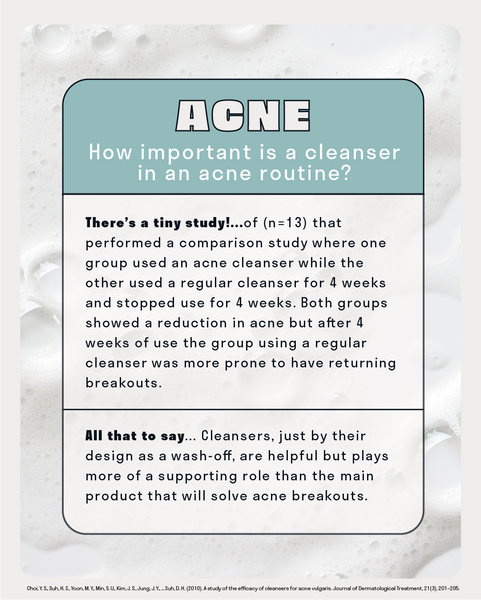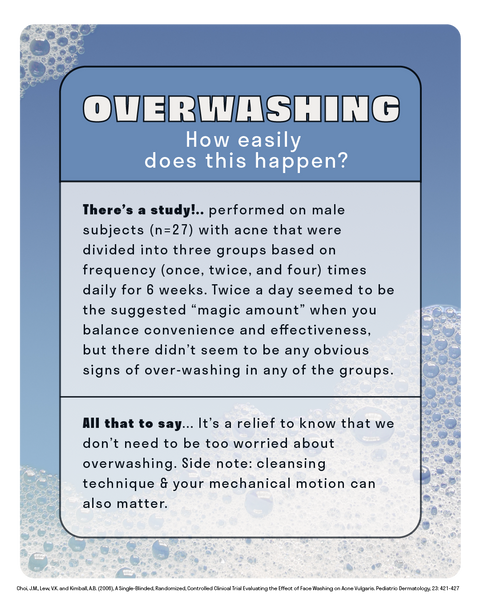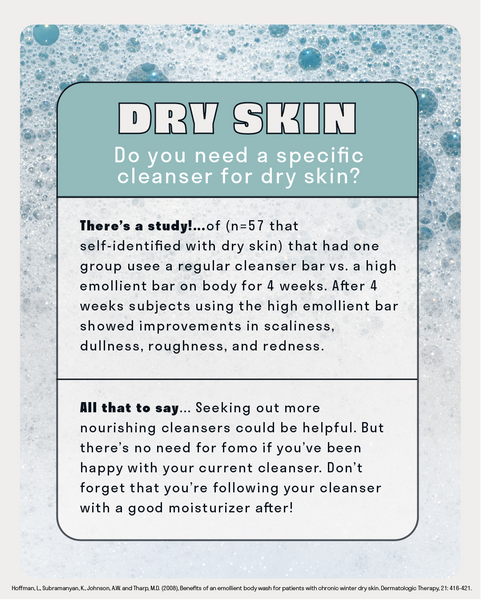In this blog post:
It would be nice if there was some scientific formula that could tell us what cleanser would best suit our skin. Most of us have spent a fair part of our adult (and young adult) lives jumping from one brand to another, hoping to find the magical product that cures all of our skin woes. The truth is, the true deciding factor that goes into choosing a cleanser is really personal preference. However, the good news is we’re going to clarify some of the more pressing questions people have about cleansers, and give you some tips on choosing your own.

Do Acne Cleansers Actually Treat Acne?
Preventing or reducing acne is one of the main reasons why people even start using cleansers in the first place, but surprisingly there's not a lot of evidence that shows that cleansers with acne actives have a significant impact over regular cleansers. Active ingredients in cleansers spend very little time on your face (before literally getting washed down the drain), so they don’t have a lot of time to work. This doesn’t mean cleansers aren’t important. It just means, for acne, cleansers will serve more as a support product in your skincare program.
We actually found a tiny (n=13) 8 week study that compared the use of regular cleansers vs cleansers with acne actives (1% salicylic acid, 0.04% triclosan, 1% azelaic acid). For 4 weeks, participants used either a regular cleanser or a cleanser with acne actives and monitored for both inflammatory and non-inflammatory acne lesions. The next 4 weeks, they didn’t use any cleanser. In both groups, researchers found that acne lesions were reduced while the participants were using the cleansers. However, for the group that used the regular cleanser, acne lesions were more prone to coming back during the 4 weeks when they stopped using cleansers.

What we would take from this tiny study is that active ingredients in cleansers can be helpful, but! they should be seen in a supportive role alongside other steps to address acne. Using a cleanser alone is not going to single-handedly solve acne breakouts.

How Easy it to Over-Wash With Your Cleanser?
How many times have we been warned against the dangers of stripping and over-washing your skin? ("Sulfates! Too much foam! Don’t cleanse too often!") Let’s take a look at a really unique study that was done on male participants with mild to moderate acne. Participants washed their faces daily for 2 weeks with a mild cleanser, before being randomly assigned to one of 3 groups. One group washed once daily, one group washed twice a day, and the last group washed 4 times a day for 6 weeks.
Those who washed twice daily seemed to have the best results, while those who washed once a day actually ended up worsening. Twice a day seemed to be a magic amount when you balance convenience and effectiveness, but there didn’t seem to be any obvious signs of over-washing in any of the groups. We will say, it would be great to see this study repeated on female subjects since there are a couple biological differences between male and female skin. However, it is a relief to know that over-washing isn't really something you need to worry about too much here.
We should mention that it is important to be mindful of the technique we use to wash our faces and the importance of being gentle with your skin if you’re experiencing a breakout or skin is more on the sensitive side. It’s already under fire, especially if you’re trying to zap away acne breakouts with a heavy cocktail of actives. Boost your use of barrier-supporting ingredients so your skin can resume its usual functions as soon as possible.

How Should Dry Skin Types Use Cleansers?
If you do an internet search for cleansers for dry skin types, there’s a good chance you’re going to find chilling warnings about using non-pH balanced, surfactant-laden cleansers. Remember that formulation matters. (Remind yourself of this. Every. Day.) There isn’t a sure-fire way of comparing all cleansers and identifying what ingredient could cause dryness. Cleansers have so many blended ingredients in different amounts, it would be incredibly difficult to say how those pieces (like surfactants and pH) affect individual people. We do know that low pH cleansers do keep your skin pH slightly lower than cleansers with higher pH levels, but this is just one piece of the complex skin puzzle.
What about cleansers that claim to be moisturizing? We can draw some conclusions from this study on body washes. Participants (n=57) were randomly split into two groups. One used a regular bar cleanser on their bodies, while the other group used a high-emollient body wash that contained ingredients like glycerin, petrolatum and soybean oil. At the 4 week mark, those who used the high-emollient wash showed a marked improvement than the non-emollient wash.

Conclusion? It probably isn’t a bad idea to try a moisturizing cleanser if your skin is dry. There may even be some benefits. But there are a lot of variables, and there are a lot of other products for dry skin besides cleansers that you can use (ya know...like a moisturizer).
If You Have Rosacea Should You Use a Cleanser?
Okay, we know we just said not to worry about over-washing too much. However, if you have rosacea, you might want to watch for over-washing.
In a Chinese survey study done in 2020, researchers found that there are risk factors to over-washing when you have rosacea, including the overuse of cleansing tools and deep cleansing masks. We do want to make a point that survey studies are tricky — it’s hard to get consistent data when it comes to people’s daily habits. They didn’t define exactly what “cleansing tools” or “cleansing masks” were used, but we believe they’re referring to things like exfoliating/cleansing brushes, towels, and clay masks.
If you do have a skin condition like rosacea or eczema, you certainly can use cleansers and exfoliants, but it makes sense to be cautious. Rosacea is a complex skin condition to treat because each person has unique triggers. If you suffer from it, you need a management plan to figure out how often your specific skin reacts to your cleansing habits (and really consider teaming up with a good derm on this!)
How Often Should You Cleanse a Day?
This goes back to the over-washing question. The only data here is that cleansing at least once a day whether you have acne, eczema, dry skin, etc. benefits skin. Removing dead skin cells, dirt, grime, and unwanted bacteria from skin is helpful and this step helps prepare skin for the rest of your skincare routine and absorb those great skincare actives we pay $$$ for. Aside from that, there's no magic number here of whether you should wash once, twice, or even thrice a day (we see you mid day gym people) and personal preference will ultimately decide. Also, it is incredibly common that throughout life the number of times you cleanse a day can change. This is a true "Listen to Your Skin" scenario.
The Value of Personal Preferences
As much as we hear about the dangers of certain ingredients (ahem alcohol, SLS etc), choosing a cleanser comes down to a lot of personal preferences.
If you aren’t sure where to start, here are some things you can think about to help narrow down your choices:
- Texture. Do you like a gel or cream cleanser?
- Habits. Do I wear makeup every day? Do I need to double-cleanse?
- Fragrance. Do I want my cleanser to have a specific smell? Do any fragrance ingredients trigger my skin?
- Foam. Note: the amount of foam varies, it isn’t tied to the strength of a cleanser. Do I mind if my cleanser doesn’t foam? Do I like a thick lather?
- Special features. Remember that exfoliators and actives in cleansers can help, but they won’t make or break your skincare routine.
Curious as to what we chemists like in a cleanser?
Gloria: Super dry skin
- Uses a splash of water during the day and double cleanses most nights
- Usually does a double-cleanse, especially if wearing makeup (likes how it removes everything without pulling on skin)
- Likes a gentle, no-frills cleanser, but doesn’t usually opt for one that claims to be hydrating
- Definitely likes a good-smelling cleanser, so “yes” to fragrance
- Cleanser MUST foam, at least a little
- Tries a cleanser 4-5 times before deciding whether it’s too drying for her (sometimes her skin just needs to adjust)
- Pet peeve: non-foaming cleansers — too slippery, just…no
Victoria: Oily, acne-prone skin
- Washes her face morning & night
- Doesn’t double-cleanse though she suspects she probably should when she wears that long wear eyeliner.
- Likes a well-rounded gel cleanser that gets the job done and absolutely doesn’t leave residue.
- Wants her skin to smell clean too, so doesn't mind fragrance
- Prefers a little foaming action because non-foaming formulas on her oily skin just feels…unsettling
- Can usually tell within a use or two whether she likes a cleanser or not
- Pet peeve: miracle acne cleansers that claim to solve all your acne problems — we all know better now!
Takeaway
- Cleansers with actives can help with acne, but are just one part in a routine and should be used as well as other steps.
- Twice daily seems to be the magic number of times to wash your face. Unless you have a skin condition, you generally don’t need to worry too much about overwashing.
- If your skin is super dry, moisturizing ingredients in cleansers do seem to help.
- If you have rosacea, be cautious about using strong cleansers and exfoliants. Each case is different, so get help from a dermatologist to figure out a skincare routine to manage the condition.
- A lot of attributes of cleansers come down to personal preference. Go with what you like!
References
Choi, Y. S., Jung, J. Y., Kim, J. S., Lee, D. H., Min, S. U., Suh, D. H., Sun, H. S., & Yoon, M. Y. (2010). A study of the efficacy of cleansers for acne vulgaris. Journal of Dermatological Treatment, 21(3). https://doi.org/10.3109/09546630903401454
Choi, J. M., Kimball, A. B., & Lew, V. K. (2006). A single-blinded, randomized, controlled clinical trial evaluation the effect of face washing on acne vulgaris. Pediatric Dermatology, 23(5), 421-427. https://doi.org/10.1111/j.1525-1470.2006.00276.x
Hoffman, L., Johnson, A. W., Subramanyan, K., & Tharp, M. D. (2008) Benefits of an emollient body wash for patients with chronic winter dry skin. Dermatologic Therapy, 21(5), 416-421. https://doi.org/10.1111/j.1529-8019.2008.00225.x
Li, G., Wang, B., Zhao, Z. et al. (2021). Excessive cleansing: an underestimating risk factor of rosacea in Chinese population. Arch Dermatol Res, 313, 225–234. https://doi.org/10.1007/s00403-020-02095-w






